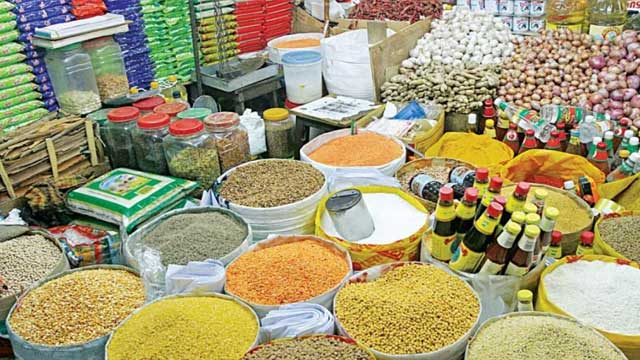The overall inflation in May hit a new high in a decade at 9.94 per cent as the prices of daily essentials continued to spiral up in the month to torment the majority of people.
Food inflation jumped to 9.24 per cent in May from 8.84 per cent in April while non-food inflation rose to 9.97 per cent in the month from 9.72 per cent in the earlier month, according to the Bangladesh Bureau of Statistics monthly update released on Monday.
Economists, however, said that the official calculation hardly reflected the actual picture as the majority of people were spending more to buy essential food items and most-needed services.
The BBS maintains a basket of 383 goods and 749 services to base its calculation of inflation.
Had the BBS maintained smaller and separate baskets of core essential items, the picture of inflation could be realistic, viewed Consumes Association of Bangladesh president Ghulam Rahman.
Still, he lamented, inflation in May is the highest in the past one decade.
The country witnessed 10.92 per cent inflation in FY2010–11.
The May inflation also surpassed the previous high of 9.5 per cent recorded in August 2022.
At a post-budget briefing on Saturday, finance minister AHM Mustafa Kamal expressed worries as the runaway inflation overwhelmed both original and revised targets set by his ministry for the outgoing FY23.
The BBS calculated average inflation for the first 11 months of the outgoing FY23 at 8.84 per cent, way above the original target set in June 2022 at 5.6 per cent and the revised target of 6 per cent set in December 2022.
Economists also criticised the government for not following standard international practices to check inflation that has been increasingly choking the fixed- and low-income groups since August 2022, after more than 50 per cent hike in the prices of fuel oils in the country.
Though inflation eased a bit, it remained over 8 per cent between November 2022 and February 2023 until it crossed 9 per cent again in March 2023.
The BBS inflation update also shows that urban people have been facing greater inflation in buying food and services than rural folk.
Food inflation hit 9.97 per cent in urban areas, where 50 per cent of the people are new poor, according to a survey carried out by the Bangladesh Institute of Development Studies against the Covid backdrop.
Policy Research Institute executive director Ahsan H Mansur said that inflation would remain at the elevated level as long as the Bangladesh Bank would follow the ongoing exchange rate policy and the current interest rates.
The BB has to change the interest rate policy, he asserted.
Many countries such as the USA, India and Vietnam have already seen success in combating inflation by making upward adjustment in interest rates, noted the economist.
Economists, he said, expect that the Bangladesh Bank would change the current 9 per cent interest maintained since 2019.
The interest rate was introduced for augmenting private sector investment and raising productivity, but private investment has not increased as per expectation.
In the outgoing FY23, the private sector investment has been projected to be 21.8 per cent of the gross domestic product, down from 24.5 per cent of the GDP in FY22, according to the Medium Term Macroeconomic Policy Statement 2023–24 to 2025–26 prepared by the ministry of finance.
The MTMPS says that the onset of the Covid pandemic in 2020 followed by the Russia-Ukraine war in 2022 inflicted stagflationary pressure on the whole world, with prices shooting on one hand and economies slowing down on the other.
The combined efforts by both fiscal and monetary policy authorities in developed as well as emerging and developing countries have not been able to fully tame inflation, it added.





